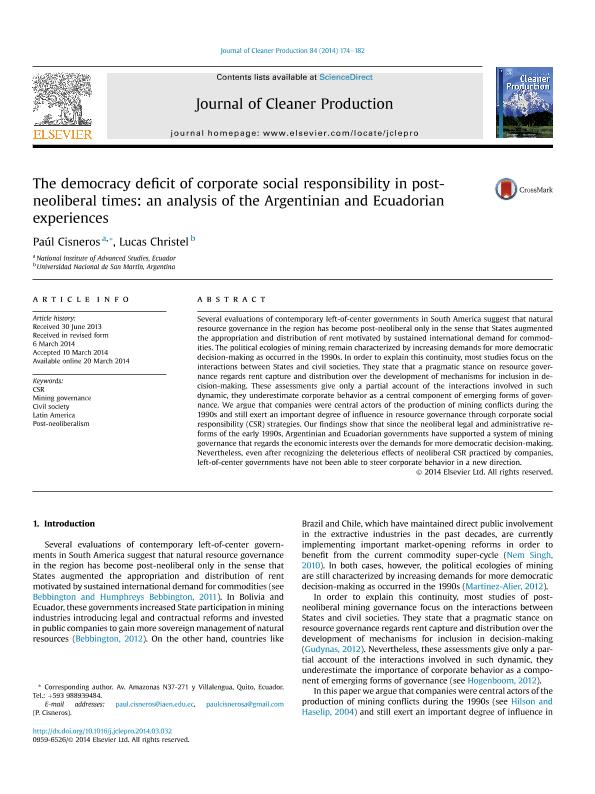Mostrar el registro sencillo del ítem
dc.contributor.author
Cisneros, Paúl
dc.contributor.author
Christel, Lucas Gabriel

dc.date.available
2019-11-13T22:22:15Z
dc.date.issued
2014-03
dc.identifier.citation
Cisneros, Paúl; Christel, Lucas Gabriel; The democracy deficit of corporate social responsibility in postneoliberal times: An analysis of the Argentinian and Ecuadorian experiences; Elsevier; Journal Of Cleaner Production; 84; 1; 3-2014; 174-182
dc.identifier.issn
0959-6526
dc.identifier.uri
http://hdl.handle.net/11336/88826
dc.description.abstract
Several evaluations of contemporary left-of-center governments in South America suggest that natural resource governance in the region has become post-neoliberal only in the sense that States augmented the appropriation and distribution of rent motivated by sustained international demand for commodities. The political ecologies of mining remain characterized by increasing demands for more democratic decision-making as occurred in the 1990s. In order to explain this continuity, most studies focus on the interactions between States and civil societies. They state that a pragmatic stance on resource governance regards rent capture and distribution over the development of mechanisms for inclusion in decision-making. These assessments give only a partial account of the interactions involved in such dynamic, they underestimate corporate behavior as a central component of emerging forms of governance. We argue that companies were central actors of the production of mining conflicts during the 1990s and still exert an important degree of influence in resource governance through corporate social responsibility (CSR) strategies. Our findings show that since the neoliberal legal and administrative reforms of the early 1990s, Argentinian and Ecuadorian governments have supported a system of mining governance that regards the economic interests over the demands for more democratic decision-making. Nevertheless, even after recognizing the deleterious effects of neoliberal CSR practiced by companies, left-of-center governments have not been able to steer corporate behavior in a new direction.
dc.format
application/pdf
dc.language.iso
eng
dc.publisher
Elsevier

dc.rights
info:eu-repo/semantics/openAccess
dc.rights.uri
https://creativecommons.org/licenses/by-nc-sa/2.5/ar/
dc.subject
CIVIL SOCIETY
dc.subject
CSR
dc.subject
LATIN AMERICA
dc.subject
MINING GOVERNANCE
dc.subject
POST-NEOLIBERALISM
dc.subject.classification
Otras Ciencias Sociales

dc.subject.classification
Otras Ciencias Sociales

dc.subject.classification
CIENCIAS SOCIALES

dc.title
The democracy deficit of corporate social responsibility in postneoliberal times: An analysis of the Argentinian and Ecuadorian experiences
dc.type
info:eu-repo/semantics/article
dc.type
info:ar-repo/semantics/artículo
dc.type
info:eu-repo/semantics/publishedVersion
dc.date.updated
2019-10-28T14:33:43Z
dc.journal.volume
84
dc.journal.number
1
dc.journal.pagination
174-182
dc.journal.pais
Países Bajos

dc.journal.ciudad
Amsterdam
dc.description.fil
Fil: Cisneros, Paúl. Institute Of Advanced National Studies; Ecuador
dc.description.fil
Fil: Christel, Lucas Gabriel. Consejo Nacional de Investigaciones Científicas y Técnicas; Argentina. Universidad Nacional de San Martín; Argentina
dc.journal.title
Journal Of Cleaner Production

dc.relation.alternativeid
info:eu-repo/semantics/altIdentifier/url/https://www.sciencedirect.com/science/article/pii/S0959652614002534
dc.relation.alternativeid
info:eu-repo/semantics/altIdentifier/doi/https://doi.org/10.1016/j.jclepro.2014.03.032
Archivos asociados
